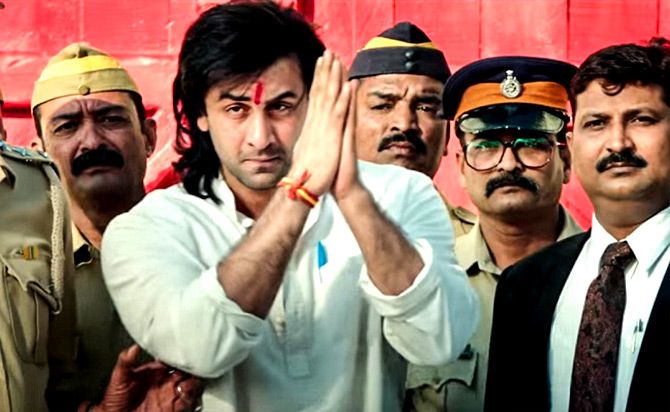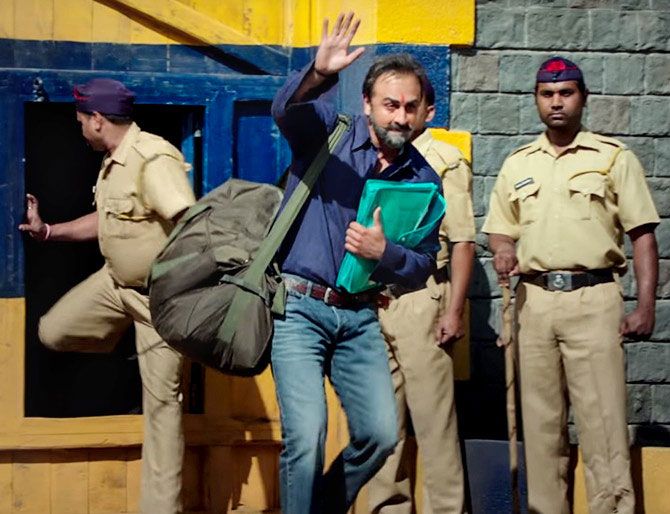Why do the biggest, most talented and successful film-makers of India suck up to the establishment so breathlessly, asks Shekhar Gupta.

Since this argument is about Hindi cinema, it is fitting that I steal the headline from Anand Bakshi in the 1972 mega-hit, starring Hema Malini and Sanjeev Kumar, Seeta Aur Geeta.
It means, let's simply: Let's just go the way the wind blows.
I had said that the Vidhu Vinod Chopra-Rajkumar Hirani film Sanju was dishonest in painting Sanjay Dutt as a gullible victim -- mostly of feral journalists.
Now I raise a broader question: Why do the biggest, most talented and successful film-makers of India suck up to the establishment so breathlessly?
Or, at a time when a Robert De Niro can say 'F... Trump' from the stage at a public event, why do India's biggest film-makers have to begin a new venture by gratuitously thanking Raj Thackeray?
Just who is that man?
For all his bluster, he cannot win more than one seat in his state's 288-member assembly and just seven in his city's 227-member municipal corporation.
Why does an ambitious film have to pay obeisance to Raj Thackeray instead of even Lord Ganesha, the presiding deity of Mumbai and the God of auspicious beginnings?
The answer is simple.
He can win nothing, but destroy much. So why take a panga?

Mumbai cinema (I try to avoid Bollywood) has had an old relationship, partly symbiotic and partly of mutual admiration, with the mafias, both underground and overground.
The larger point is, it is equally submissive and sycophantic before all authority, including the government.
It's a curious facet of our society that our creative classes tend to be establishmentarian.
Barring sections of academia, painters and some media, most leaders of the creative and popular culture are happy to fawn upon anybody who holds power -- governments or the mafias.
You might give some leeway to classical musicians and dancers because those genres haven't built much economics as yet.
But why does Hindi cinema, with its multi-hundred crore opening weekends and multi-billion-dollar studios, behave so disgracefully?
It originates in our durbari culture.
Maharajas and later sultans and badshahs were patrons of art and culture.
You had to be a court musician, dancer or painter to monetise your talent and acquire honours and fame.
The royalty was succeeded by 'Bharat Sarkar', but the court culture remained.
The government gave you grants, scholarships, foreign trips, sinecures, exhibitions, bungalows in Lutyens' Delhi and Padma awards.
Two sets of creative people broke out of this early: Writers, especially poets, and painters.
The first because of their strong Left orientation and the second because painting became big, paying business.
The one that became the richest and the most powerful unfortunately became the most pusillanimous.
Its initial fire went out with the generation of Leftists -- lyricist-poet Gulzar, 83, is among the few left with a spine.
The rest mostly became happy durbaris and court bards.
In generations now, only a few top stars ventured into real, competitive politics.
Amitabh Bachchan retired hurt within three years. Never to again utter a word which would seem even remotely questioning anybody in power.
He did acquire a voice briefly to outrage over 'Nirbhaya' and a few other fashionable issues, but that was when the government had already been decapitated and knee-capped.
But we know how 'dignified reserve' became his mantra over the more recent Kathua and Unnao. You might play 'Sarkar' in a film, but why take panga with a real one?
Some brave, honourable exceptions -- Raj Babbar, Shatrughan Sinha, Hema Malini, Smriti Irani, even Divya Spandana -- bravely carry on.

You wouldn't complain so much if your top film-makers weren't so sanctimonious.
Hirani has made brilliant hits with strong social messaging, from 3 Idiots to PK and the Munna Bhai series.
With Mission Kashmir, Chopra taught us patriotism and we showed grateful appreciation as his good guys demolished the ISI's abominable designs in his native state.
But in the city where they live, they gave the same ISI an easy way 'out'.
Sanju as a gullible victim works much better with 'Aam Janata' than a fascinatingly flawed yet talented character.
More important, Dawood Ibrahim, brother Anees (who Dutt is said to have called six times on the day he received the rifles, grenades and ammunition) and the mafia are still alive and run their empire from Karachi.
Why take pangas?
The top stars have an easy excuse: They have too much at stake.
Aamir Khan made the 'mistake' of speaking out once, and the blowback hurt him. His biggest brand-sponsorship deal was shamefully withdrawn.
Shah Rukh Khan hadn't even gone that far when he was hit in the neck, and has been mum since.
Shah Rukh has at least made a silent statement by playing leading characters with Muslim names in several films.
Salman, on the other hand, has focused entirely on playing a good, all-conquering Hindu, demolishing even ISIS in one of his latest. He's got a problem you see, being a convict like Sanju.
Conventional logic is, popular culture reflects the reality of our times.
In India cinema sniffs this earlier than even politicians or marketers. But Hindi cinema has ceased to do so lately.
It has been 'opening'-obsessed and short of ideas and while there's been some venturing into socially relevant themes, the trope always is the Superman hero.
The media dare not complain for fear of losing access. Even on Sanju, I am not complaining that it throws ugly 'gaali' at journalists.
I fully understand cinema being contemptuous of journalists when they can happily buy prime newspaper and TV space, adulation and reviewer star-ratings for money.
With tariff cards and all. My simple point is this won't change the history of the 1993 bombings.

The powerful film world can be an agent of change and help protect the weak, underprivileged and minorities.
It can't do so when it instinctively bows to anybody with power -- the government, a bully like Raj Thackeray, or Dawood Ibrahim.
They won't even challenge social prejudice and hierarchies.
They might make a film on toilets because the government would like it, but none of the top 10 stars of Hindi cinema has played a Dalit, or even a distressed farmer in a long time.
Southern superstar Rajinikanth would do so with pride and panache.
Remember, the same film world had prostrated itself before the bhais. They didn't go in a procession to the prime minister to protest. They quietly made their peace.
And later, when a small band of Bombay police shooters started putting the gangsters away in 'encounters', they began worshiping them.
I featured two of these, sub-inspectors Daya Nayak and Pradeep Sharma, each with a score of about a hundred 'kills', on my show NDTV show Walk The Talk.
Nayak told the story of how the superstar of superstars financed the construction of a hospital in the cop's mother's name in his native village. He then left the Bombay police top brass astounded by going to the village in Karnataka to inaugurate it.
But when the same cops got into trouble with the courts, were suspended and arrested (later acquitted) nobody helped. They no longer had the guns and licence to kill, so were expendable now.
There is some new hope.
Many of the newer film people aren't afraid to wear their hearts on their sleeve and to question the powers that be.
We should celebrate the fact that their tribe is growing, and becoming more successful.
They aren't the top stars yet, and maybe will never be. But they are a powerful, growing presence.
The rest, at the top, can meanwhile go with the wind, hawa ke saath saath, ghata ke sang-sang...
By Special Arrangement with The Print












 © 2025
© 2025